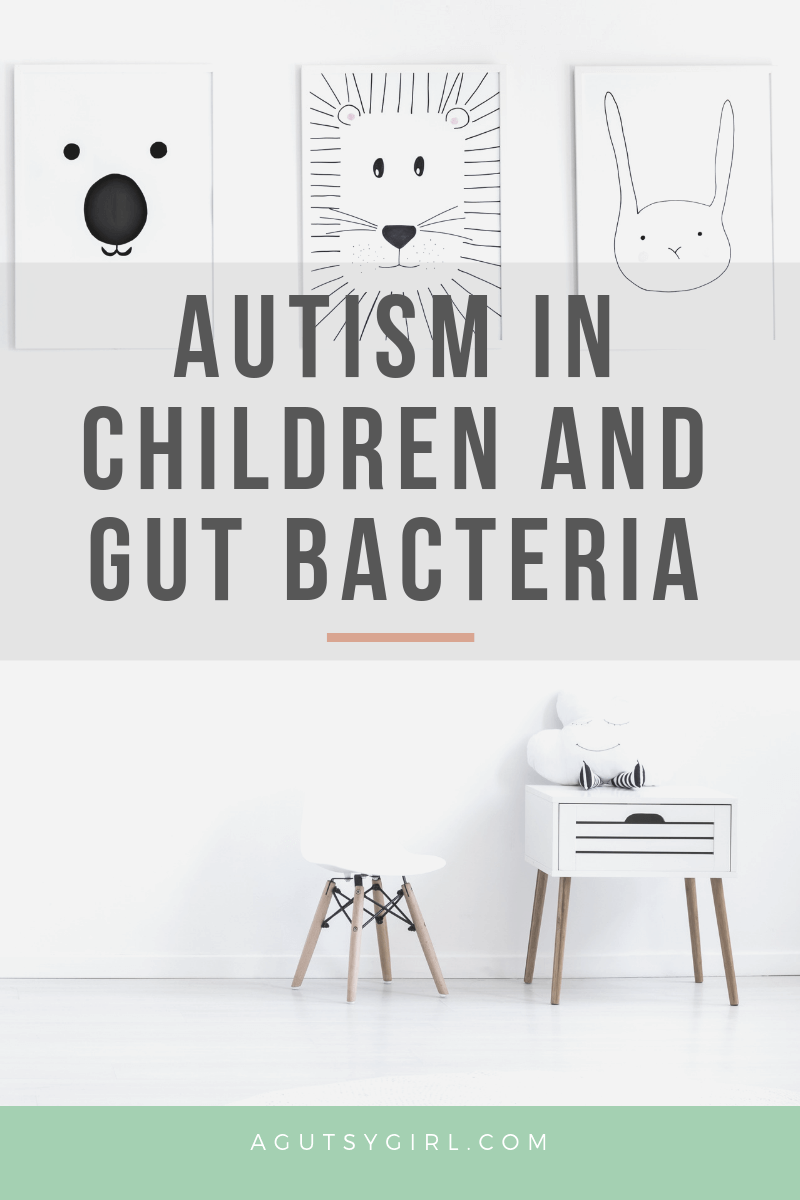Recently, I’ve been getting this question a lot, “What are your thoughts on Autism in children and gut bacteria?”
I didn’t understand at first, until my brother sent me the article, “More evidence that autism is linked to gut bacteria.” Both the questions and him sending the article happened within days of each other. There was my answer as to why everyone started asking the questions.
Perhaps my favorite question was when a mother reached out asking, “Have you written at all about children’s gut health?”
Ah, why yes, I have. In fact, when I re-launched this website to 100% A Gutsy Girl, I added a tab solely for this topic, “Gutsy Children.”
Before I dive into thoughts on The Economist article, here are a couple other (recent) posts I’ve written that relate to the gut-brain axis (<- that includes autism + gut bacteria).
Autism in Children and Gut Bacteria
Click HERE to save this post for later.

First thing’s first. Everyone wants to know this one burning question –> Do I believe that the gut-brain axis is real and that autism in children could be related in any way to gut bacteria?
A hard and firm, YES is my answer.
The conclusion of The Economist article was, “evidence (for autism) is pointing towards the bacteria of the gut. That suggestion has been reinforced by two recently published studies—one on human beings and one on laboratory rodents.”
(Side note: I am currently reading and exploring gut health with Dr. Michael Ruscio in his book Healthy Gut, Healthy You. It’s the first Virtual A Gutsy Girl Book Club book. In the first part, Importance of the Gut, he discusses how we should not only rely on animal studies, but instead many different studies to form a valid opinion. That’s what I appreciated about this article in The Economist – the conclusion came from both human beings and animals.)
Article Facts
- ASD is characterised by repetitive, stereotypical and often restricted behaviour such as head-nodding, and by the difficulties those with it have in reading the emotions of, and communicating with, other people.
- These symptoms are noticeable in children from the age of two onwards.
- Currently, in America, about one child in 59 is diagnosed with ASD.
Article Study Points
- From the human study, researchers found that the bacteria from 20 autistic children in the sample were missing hundreds of the thousand-plus bacterial species that colonise a “neurotypical” person’s intestine.
- One notable absence was Prevotella. This bug, which makes its living by fermenting otherwise-indigestible carbohydrate polymers in dietary fibre, is abundant in the alimentary canals of farmers and hunter-gatherers in places like Africa, rare in western Europeans and Americans, and nearly nonexistent in children with ASD.
- Once the researcher’s restored the missing bacteria (via MTT; microbiota transfer therapy), the changes in that gut bacteria translated into behavioral changes.
- Of the 18 children who participated in the study, 15 of them rated “severe.” But after two years, only three of them still rated as severe, while eight fell below the diagnostic cut-off point for ASD altogether.
Autism in Children and Gut Bacteria: Not a New Idea
This idea that there could be a connection between the gut and brain, even autism in particular, is nothing new.
People have been theorizing and studying its direct correlation for years. In fact, I first became fixated on the idea in 2009, when I first picked up Dr. Natasha’s book, “Gut and Psychology Syndrome“, which I have talked and written about in length since 2009.
The book is based on Dr. Natasha’s research around natural treatment for Autism, Dyspraxia, A.D.D., Dyslexia, A.D.H.D., Depression, and Schizophrenia. I had researched that people were healing their gut lining following the GAPS protocol, but at the time had no idea just how much I’d start learning about the gut-brain connection.
And it wasn’t only Dr. Natasha (clearly) studying this concept. There have been numerous researched publications that have come out, including (in case you want even more great reads today):
- The microbiota–gut–brain axis and its potential therapeutic role in autism spectrum disorder (June, 2016)
- Autism and nutrition: the role of the gut-brain axis (2014)
- The possibility and probability of a gut-to-brain connection in autism (2009)
- Autism and Gastrointestinal Symptoms (2002)
I believe that when it comes to autism in children and gut bacteria, we are only at the beginning of researching and studying the correlation. Even though people have already been doing it for years, The Economist writing about it sheds another mainstream light on it.
And this is a good thing.
Xox,
SKH
🤰 bloating be gone! weight loss through optimal gut health for women
💃ʜᴇᴀʟ ʏᴏᴜʀ ɢᴜᴛ. ʜᴇᴀʟ ʏᴏᴜʀ ʟɪfe.
🫶🏻 founder gutbyome.com






![Create Your Own FODMAP Diet Plan [Using These 310 Graphics]](https://agutsygirl.com/wp-content/uploads/2020/10/journal-sibo-writing-featured-agutsygirl.com_.png)
This was a timely story! Thank you♥️